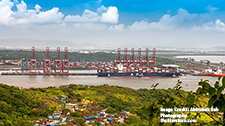Stockholm Center for South Asian and Indo-Pacific Affairs

The Stockholm Center for South Asian and Indo-Pacific Affairs (SCSA-IPA) is a Center at ISDP that focuses on the politics, economics and society of South Asia, as well as security and development in the Indo-Pacific region. Keeping in mind the emerging importance of South Asia in global affairs, the SCSA-IPA seeks to contribute to building a knowledge base familiar with regional dynamics in Stockholm.
International Exchanges
The SCSA-IPA aims to serve as a nexus of academic reflection and international dialogue. In collaboration with its South Asia-based partners, it aims to hosts a number of high-level delegations in Stockholm on an annual basis. Delegations will have the opportunity to meet with Sweden and Europe-based academics, officials and entrepreneurs. At the same time ISDP will organize Nordic delegation visits to South Asia to help familiarize the European research community with their South Asian counterparts.
Visiting Fellow Program
The SCSA-IPA will maintain a visiting fellow program to host both young and established scholars from South Asian partner institutions. During their stay in Sweden, visiting scholars will benefit from taking part in the Center’s activities and complete at least one paper for dissemination in ISDP’s publication formats.
Conferences & Webinars
The SCSA-IPA will arrange an annual conference focusing on South Asian and Indo-Pacific affairs. This event will alternately be hosted in Stockholm and in South Asia, with the aim of becoming a platform for high-level exchanges and deliberation between the South Asian institutes, think-tanks and academic communities, as well as European academic and policymakers. The SCSA-IPA will also host an annual South Asia-Nordic Forum with invitees from South Asia and the Nordics. The expectation is to bring together five South Asians and five Nordic scholars for dialogue, reinforcing South Asia-Nordic networks and providing opportunities to identify common areas for further research.
Throughout the year, the SCSA-IPA will arrange webinars to disseminated specialized knowledge to the public and generate discussions between European and South Asian experts. The webinars will be posted on ISDP’s website as well as through Facebook and other social media platforms.
Research
The SCSA-IPA seeks to support research on South Asia, publishing pieces that explore social, political and economic studies of the region and disseminating their findings through public events.
At present the work of the center covers the following:
Conflict Dynamics: South Asia is characterized by numerous conflicts that could have repercussions for the wider region. The SCSA-IPA focuses on the dynamics of these disputes and explore potential policy responses. This includes study of territorial disputes, civil strife and internal conflicts, emerging strategic competition in the Indian Ocean, as well as the security implications of developments such as migration and climate change.
Development Cooperation: Development needs are often cited as a driver of regional conflict trajectories, as well as the politics and economics of South Asia. On the subcontinent cross-border dynamics and regional cooperation play a major role in shaping access to the resources necessary to combat poverty and boost prosperity. The SCSA-IPA focuses how European and Swedish institutions can link their work with South Asian partners and bridge the gap between peacebuilding, development initiatives and promoting the United Nations’ Sustainable Development Goals (SDGs).
Infrastructure & Corridors: South Asia is notable for comparatively low degrees of regional trade between states. The region is one of the world’s least economically integrated, due in part to to the long history of political tension and mistrust between its governments. Yet important areas corridors such as the Bay of Bengal and Indian Ocean have become central to the Indo-Pacific Concept. Transportation corridors and regional connectivity have emerged as a key area of study. SCSA-IPA focuses on the various approaches to infrastructure promotion and the implementation of economic and social policies designed to collaborate with the private sector to address regional vulnerabilities.
Newsletter
The Stockholm Center for South Asian and Indo-Pacific Affairs publishes a bi-monthly newsletter, the ‘India-Sweden Strategic Compass’. The newsletter focuses on current affairs, highlighting Sweden and India relations, India-Nordic relations, EU-India relations, domestic developments in India, and relevant international updates.
Related News
Related Publications
-
Jagannath Panda: “India’s INSTC Commitment Is Not Reliant on Western Endorsement”
Interview conducted by Ilya Roubanis, Caucasus Watch The International North-South Transport Corridor (INSTC) is a 7,200km mostly overland network stretching from India to Russia, via Azerbaijan and Iran, branching […]
-
Not Drawing a Parallel. Ukraine and Taiwan: An Indian Perspective
Russia’s war against Ukraine has not only had economic, diplomatic, and geopolitical repercussions, but also exaggerated the fear of accelerated conflicts in the Indo-Pacific, a region with several unresolved conflicts […]
-
Intersecting Horizons: The Nexus of Maritime Security and Global Health
The maritime industry is often regarded as one of the primary engines of the global economy as it is the backbone of global trade, accounting for around 90 percent of […]
-
EU-Thailand FTA Negotiations: IUU Fishing and Human Rights Remain Obstacles
Thailand’s fishing industry, which at its height saw as many as 200,000 migrant workers from neighboring Laos, Myanmar, and Cambodia caught in a brutal system of abuse, withered global criticism […]
-
Trade, Connectivity and Supply Chains in EU-India Relations
In the decade and a half since 2007 when the EU and India first started their FTA negotiations, the world economic order has undergone a sea change. During that period, […]




